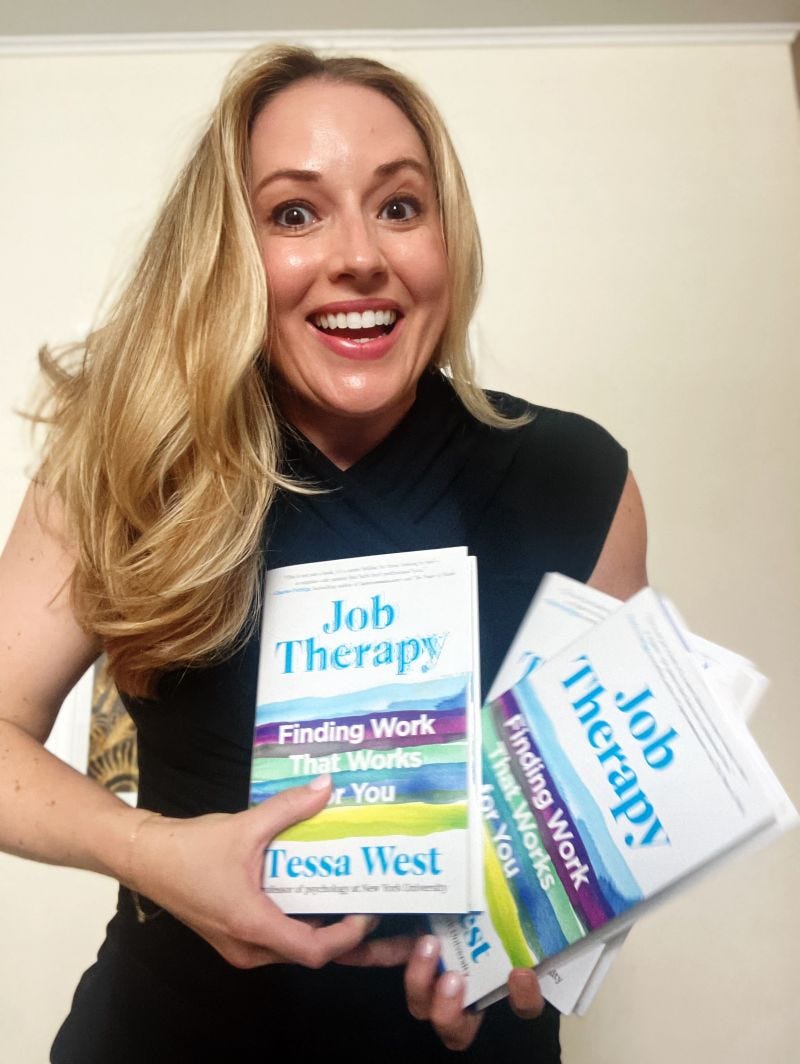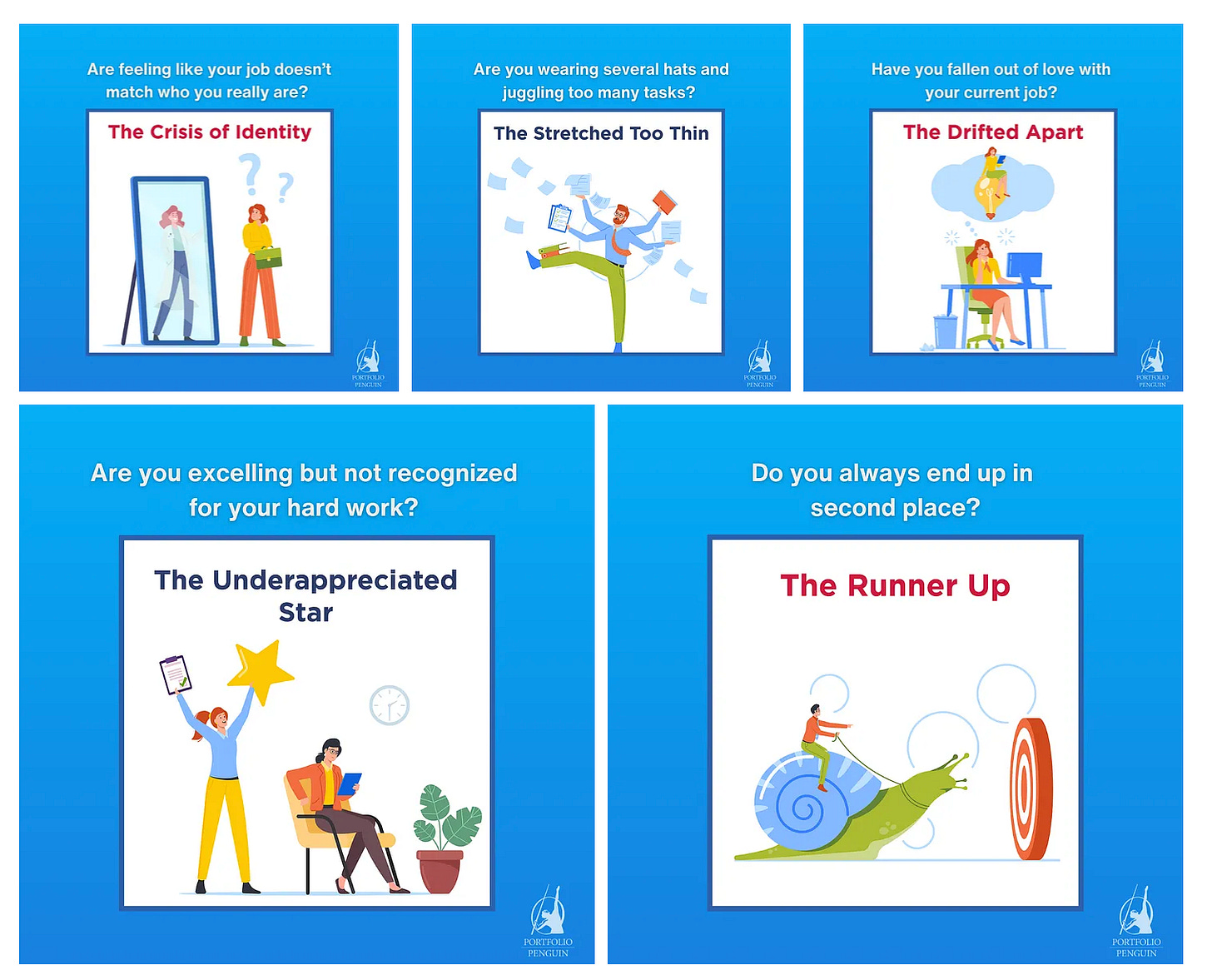Finding work that works for you: Job Therapy with Tessa West
Issue 128: A psychologist’s guide to finding your most fulfilling job yet, dealing with an identity crisis in your career, and a FREE BOOK Giveaway!
When we’re unhappy in our jobs, we often attribute our frustration to a bad manager, boring tasks, and stressful workloads. But our dissatisfaction at work usually stems from a deeper psychological need that’s not being met at work, like not getting the recognition you deserve or a sense that you don’t identity with your job or employer.
This week we interview Dr. Tessa West, Professor of Psychology at New York University, about her new book "Job Therapy: Finding work that works for you". Her book will help you figure out the real reason you’re unhappy and help you find a new position in which you’ll thrive whether in a different role, company, or new industry. Tessa interviewed Jay for her chapter on the identity crisis and she included a measure of social identity in her book so readers can assess themselves.
Tessa’s book is designed to help readers identify their unique psychological stressors to determine the next step in their career. Through her interviews and surveys with thousands of people who have recently switched jobs or undergone career changes, she found there are five common sources of career frustration:
Identity crisis – When your sense of self no longer matches your job.
Drifting-apart – When you no longer recognize the job you once loved.
Torn between places – When you taking on too many roles at work, switching tasks too often, or feel stuck between two paths.
Runner up – When you keep coming in second place.
Under-appreciated star – When you crush it at work, but the people around you don’t recognize or reward your performance.
We interviewed Tessa for her previous book Jerks at Work. If you enjoy her interview below, you can subscribe to her newsletter where she offers “help with your trickiest workplace dilemmas.” More importantly, you can buy her new book, Job Therapy, here.
We are offering a special free book giveaway to the people who can use Job Therapy for the greater good. If you run a college career center, facilitate workshops in businesses, can spread the lessons on a popular newsletter, or something else that will help others, enter our giveaway for a free copy of the book. Tessa will select the 15 most impactful proposals for a free book. Fill out this form.
What does your book teach us about social identity or group dynamics?
Identity plays a huge role in people’s relationships with their careers. Sometimes, we feel highly identified with our career–it’s a core piece of who we are as a person–yet we feel uncertain of whether we want to continue down this path. We wake up in the middle of the night in existential terror, thinking to ourselves, “is this it?” The opening chapter of this book is called the “Identity Crisis,” and it’s about this person. Many have spent years perfecting their career identity, and have a lot of guilt and uncertainty about leaving it behind.
In this chapter, I not only talk about identity centrality–how much your identity defines you–but also, identity satisfaction–the identity you hold makes you happy. There are a lot of people who are identified with careers that make them miserable. We see this a lot in health care, and other professions with high rates of burnout. It’s a psychologically dangerous place to be.
One goal of this book is to help people process these complicated pieces of identity. This journey starts with understanding whether you want to stay on your career path or try something new, which involves “dating” new identities to develop clarity around what new careers are like.
And it’s important to note that there are plenty of people who don’t feel highly identified with their career; they have other identities. To them, a job is just a job. These people are often unhappy because they work in an industry or in a company that wants more identity investment than they’re willing to give. They hear things like, “everyone else here has gone all in with this job, so why don’t you? For these people, there’s an identity-mismatch. The problem comes down to fit.
I interviewed Jay Van Bavel in this opening chapter, and he talks a lot about how we don’t know how identified we are with a career until we’re about ready to give it up–the psychology of nearing an identity break-up. He gives great advice on how to process that identity loss before you move on to developing a new one.
What is the most important idea readers will learn from your book?
That we have a relationship with our careers--they aren't just something that we do. And that relationship can come with emotional ups and downs. You need to process your feelings with your career–truly understand the psychological roots of unhappiness–before you should be applying for jobs.
Finding a career that fits takes time; it won’t happen overnight. But small moves, like meeting a few new people a week, will help you get there. This journey isn’t about applying for a ton of things and hoping something will land. It’s about making smart moves, and fewer of them, in a particular order. To this end, each chapter of my book is organized around 4 stages of the job discovery and application process.
Why did you write this book and how did writing it change you?
I was teaching a close relationships class at NYU and I realized that the ways people were talking about their careers were similar to how people talk about their relationships with their romantic partners. Jealousy and embarrassment, shame and pride, concerns about rejection and fears around honest communication–themes we usually see in the romantic relationships space, kept coming up in the world of work. I remember talking to a journalist who asked me, “what trends should we expect to see around job interviews–will people stop showing up?” and I said something like, “well, people are now no-showing on first dates and ghosting each other, so expect that next.” And I was right!
This book did change the way I think about my career. One concept that really resonates with me is this idea that we often “slide” into relationships instead of “deciding” into them (in fact, most couples who live together never had a conversation about cohabitating; they just slowly moved their stuff into one person’s house, effectively “sliding” into it). It’s easy to slide into roles at work. One day, you’re helping your boss or a team member out with an extra task; the next, you have some new role you never signed up for. Writing this book made me much more deliberative about the jobs I take on. If I feel myself sliding into something, I try to slow down, have honest conversations with the person asking me to do these jobs, and make a choice about whether I want to take it on.
What will readers find provocative or controversial about your book?
I think the idea that when it comes to landing a job, “less is more” shouldn’t be provocative–most of us know deep down that we need to make careful, methodical moves–but these days it is. You see a lot of social media posts about the person who applied for 600 jobs and got nothing, which is framed as evidence that the market sucks. But in all of my interviews with hiring managers and leaders, there was one theme that kept coming up: People are submitting generic materials, not tailored to jobs. They aren’t describing how their different roles talk to each other; they aren’t framing up their experiences or creating a narrative around what they learned. They are just listing stuff. And part of that comes from not really understanding, at a deep psychological level, what you want. It’s a bit like putting a dating profile out there, listing all you have to offer, without processing what type of partner you’re trying to signal these things to. That perspective taking comes with digging down deep.
I also think that the work you really need to do can’t be done by passively reading stuff from your couch. You will need to get out and talk to people. A 15-minute conversation in which a new acquaintance tells you all about the hidden curriculum of a career–what it really takes to get ahead, not the stuff found on company websites, and not the reviews on Glassdoor–is worth its weight in gold. Have as many of those as you possibly can.
Do you have any practical advice for people who want to apply these ideas (e.g., three tips for the real world)?
Yes, each chapter of my book gives you concrete guidance on how to network (down to who, exactly, you should be reaching out to); what to ask of network connections, how to write cold emails. I also give concrete advice on resume writing and interviewing, down to the questions you should be asking to have an honest interview.
Here’s a few tips you can keep in mind as you go through the stages of the book:
I encourage a lot of radical honesty, and that includes asking tough questions during interviews like, “what does it look like to fail at this job?” Don’t worry about offending interviewers with questions like these; they prefer them. These questions show that you’re thinking deeply about fit and longevity in a job. Hiring managers don’t want to see people-pleasing during interviews–nodding your head and saying yes to everything and not pushing back. They want to see tough questions.
Don’t be afraid to reach out to a stranger. I had to do a lot of networking with strangers for this book, and I was nervous about it. But guess what: People love talking about themselves! Think of networking as learning new things about people’s experiences; it’s not about impressing people. With that mindset shift, you’ll feel less cringey about networking.
Don’t feel pressure to move quickly on a job change or a career transition. The steps I encourage you to take in this book can all be done while you’re still employed. You don’t need closure on one thing to explore another.
Do you need Job Therapy? Tessa created this quiz to see what type of career challenge each person is struggling with.
According to the quiz Jay is "Stretched too thin!" Sadly, very true.
News and Updates
Jay and Tessa are both speakers at The Lavin Agency where they share research on the science of collaboration—practical strategies for building thriving teams.
Catch up on the last column…
Last week, we shared our latest research on the psychology of polarization and climate change. Check it out:





